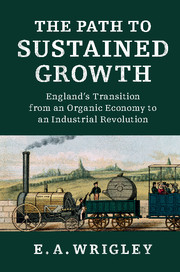 The Path to Sustained Growth
The Path to Sustained Growth Book contents
- Frontmatter
- Dedication
- Contents
- List of figures
- List of tables
- Acknowledgements
- Introduction
- 1 Organic economies
- 2 The classical economists
- 3 Energy consumption
- 4 Urban growth and agricultural productivity
- 5 Changing occupational structure and consumer demand
- 6 Demography and the economy
- 7 Transport
- 8 England in 1831
- 9 The completion of the industrial revolution
- 10 Review and reflection
- Bibliography
- Index
9 - The completion of the industrial revolution
Published online by Cambridge University Press: 05 January 2016
- Frontmatter
- Dedication
- Contents
- List of figures
- List of tables
- Acknowledgements
- Introduction
- 1 Organic economies
- 2 The classical economists
- 3 Energy consumption
- 4 Urban growth and agricultural productivity
- 5 Changing occupational structure and consumer demand
- 6 Demography and the economy
- 7 Transport
- 8 England in 1831
- 9 The completion of the industrial revolution
- 10 Review and reflection
- Bibliography
- Index
Summary
During three centuries from the mid sixteenth to the mid nineteenth century the English economy changed from being a laggard compared to the most advanced economies on the continent to being the leader of the pack by a substantial margin. During the second half of the nineteenth century, however, the wheel turned again, and England ceased to be either a laggard or a leader. Consideration both of the circumstances that gave rise to the divergence between English experience and that of the bulk of the continent, and to the subsequent convergence which took place, is the subject matter of this chapter. Reviewing these changes also throws light on the timing of the completion of an industrial revolution in England. That its completion promoted further change whose character severely affected the regions of England closely identified with the initial accomplishment of an industrial revolution is briefly discussed in the final section of the chapter.
The concomitants of urban growth
A first topic to consider in relation to the period of divergence between England and her continental neighbours is the extent of the contrast in the scale and character of urban growth in the seventeenth and eighteenth centuries. It was both striking and significant. It offers an opportunity to explore the developments which gradually weakened the constraints on growth which were universal in organic economies, strengthening the prospect of securing prolonged growth and a sustained rise in the real incomes of the mass of the population: in short, of bringing about an industrial revolution. It also exemplifies the scale of the difference between changes on either side of the Channel, and suggests why comparable development was inhibited on the continent.
An increase in the proportion of the population living in towns is a reliable measure of the level of productivity in the agricultural sector (assuming, for convenience, that urban food supplies are locally produced rather than imported). Since those living both in towns and in the countryside must be fed, only if productivity is high enough to produce an increasing surplus above local rural requirements is urban growth possible. Bairoch concluded that in early modern Europe the maximum proportion of the population that could live in towns with 5,000 or more inhabitants was 13–15 per cent.
- Type
- Chapter
- Information
- The Path to Sustained GrowthEngland's Transition from an Organic Economy to an Industrial Revolution, pp. 173 - 197Publisher: Cambridge University PressPrint publication year: 2016
